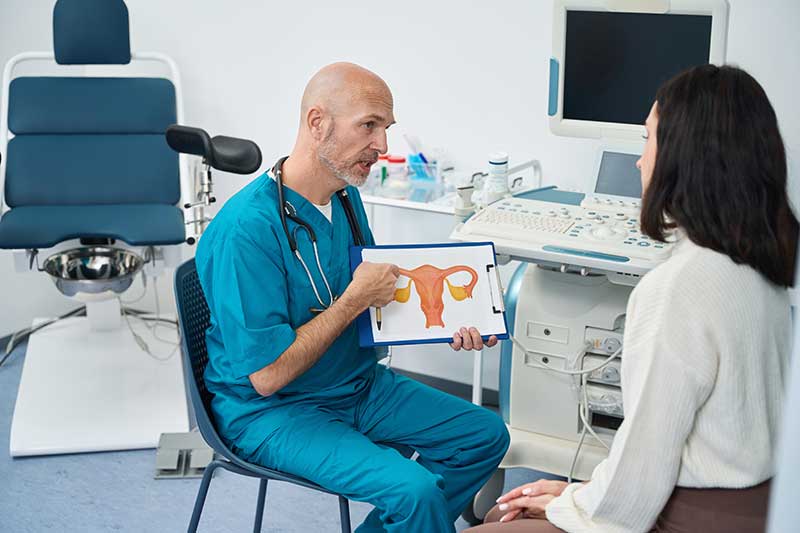Gynecological health is an important part of women’s total well-being, yet it is rarely discussed. Understanding common gynecological disorders is critical for timely diagnosis, successful treatment, and a great quality of life. In this blog, we’ll look at three common gynecological disorders: endometriosis, polycystic ovary syndrome (PCOS), and uterine fibroids. By putting light on their symptoms, causes, and treatment options, we hope to equip women with vital insights into effectively managing their health.
Endometriosis: A Painful Mystery
What is endometriosis?
Endometriosis is a disorder in which tissue comparable to the lining of the uterus (endometrium) begins to grow outside the uterus. This abnormal tissue growth can affect the ovaries, fallopian tubes, and pelvic lining, resulting in chronic discomfort and other symptoms.
Symptoms of Endometriosis
- Severe menstrual cramps.
- Chronic pelvic pain.
- Pain during intercourse.
- Heavy menstrual bleeding
- Infertility
- Fatigue, diarrhea, constipation, and nausea.
Causes of endometriosis
The precise etiology of endometriosis is unknown, but various theories exist, including retrograde menstruation (when menstrual blood travels backward into the pelvic cavity), hereditary factors, and immune system issues.
Treatment Options
- Medications include pain relievers such NSAIDs, hormonal therapy to lessen or eliminate menstruation, and birth control tablets.
- Surgery: Endometrial growths are removed via laparoscopy, or in severe cases, a hysterectomy.
- Lifestyle Changes: Making dietary changes, exercising regularly, and managing stress can all help to alleviate symptoms.
Polycystic Ovarian Syndrome (PCOS): Hormonal Imbalance
What is PCOS?
PCOS is a hormonal illness that affects many women of reproductive age. It is distinguished by enlarged ovaries with tiny cysts and an imbalance of reproductive hormones.
Symptoms of PCOS
- Irregular menstruation periods.
- Excess androgen levels cause hirsutism (excessive face and body hair), acne, and male-pattern baldness.
polycystic ovaries - Weight increase or difficulty loosing weight?
- Insulin resistance and elevated risk of type 2 diabetes
- Infertility
Causes of PCOS
The specific cause of PCOS is unknown, however it is thought to be a combination of hereditary and environmental factors. Insulin resistance and inflammation are thought to have an important impact.
Treatment Options
- Weight loss with a healthy diet and regular exercise can help alleviate discomfort.
- Medications include birth control pills to manage menstrual cycles, anti-androgen medications to suppress hair growth, and insulin resistance treatments such as metformin.
- Fertility treatments include clomiphene citrate and assisted reproductive technologies (ART) for women who are infertile.
Uterine fibroids are benign tumors.
What are uterine fibroids?
Uterine fibroids are non-cancerous tumors that originate in or on the uterus. They vary in size and frequency, but are most frequent in women during their reproductive years.
Symptoms of uterine fibroids
- Heavy or extended menstrual cycles
- Pelvic pain or pressure?
- Frequent urination
- Difficulty emptying bladder
- Constipation
- Backache or leg pains
Causes of uterine fibroids:
The specific etiology of fibroids is unknown, but genetic alterations, hormone imbalances (especially estrogen and progesterone), and growth factors are thought to contribute to their formation.
Treatment Options:
- Watchful waiting entails monitoring fibroids if they do not cause severe symptoms.
- Medications: Hormonal medications that decrease fibroids and alleviate symptoms.
- Noninvasive procedures include MRI-guided focused ultrasound surgery (FUS).
- Minimally invasive procedures include uterine artery embolization (UAE) and laparoscopic or robotic myomectomy.
- For severe cases, traditional surgery may include abdominal myomectomy or hysterectomy.
Understanding three common gynecological conditions—endometriosis, PCOS, and uterine fibroids—is critical for early detection and successful treatment. If you have any symptoms related with these illnesses, speak with your doctor about appropriate testing and treatment. These disorders can be managed with proper care and lifestyle adjustments, resulting in a better and more comfortable life. Remember that your gynecological health is an important element of your overall well-being. Stay informed, proactive, and in charge of your health.

